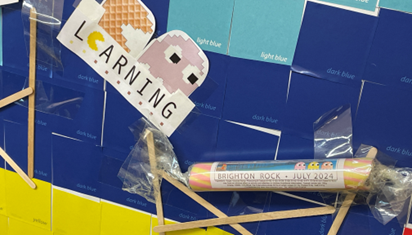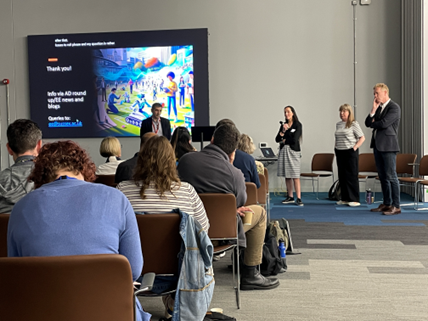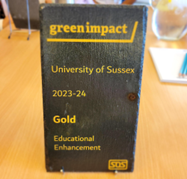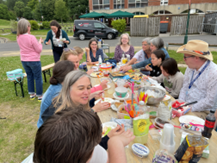Simon Overton:
Today I am joined by Brena Collyer De Aguiar, Online Distance Learning Manager focusing on Course Development and Delivery, and Senior Learning Technologist for ODL. Welcome, Brena.
Brena Collyer De Aguiar:
Thank you, Simon.
Simon:
Why don’t we start by you telling me exactly what you do? What do you get up to every day?
Brena:
Basically, as a Senior Learning Technologist, I support academics involved with the ODL courses we have at Sussex. This includes supporting them in teaching, developing, or refreshing modules. I also deliver training, encouraging academics to innovate and improve their teaching practices.
As ODL Manager, I liaise with our partners for course development, best practice reviews, accessibility, and incorporating technology to enhance learning engagement.
Simon:
ODL is, I think, one of the shining stars of Education Enhancement at Sussex. Why don’t you describe what ODL actually is and what we offer?
Brena:
We offer nine fully online courses, including Master’s courses, PGCEs, PGDIPs, and a CPD course. Our students are around the world—in about 150 countries last time we counted.
Simon:
Do you know how many students have gone through the ODL?
Brena:
Our courses are built to be flexible, so students can join at different points and take breaks when needed for careers or family commitments. I think the last intake was about 900 students, with others on break or graduated already.
Simon:
So, you’ve been involved in a project called Project Dandelion. Dandelions are lovely, but I’m sure it’s not just about dandelions. What is it actually about?
Brena:
The project gamifies a module on sustainable development. One of our academics, Lucila Newell, the module leader, noticed students were feeling depressed studying issues like food waste and climate change. In response, we decided to gamify the module to engage students more positively. Students complete missions, quests, and challenges in a narrative-driven experience where they travel back from a future where climate issues have been resolved to understand the solutions that got us there.
The narrative includes time travel, and we place students in a setting where climate issues are already solved. Their role is to document what was done to achieve this, not to “save the world.” The dandelion symbol represents spreading seeds of change and healing.
Simon:
That’s so lovely. I noticed that instead of modules, you’ve got missions—correct?
Brena:
Yes. We added gamified elements like missions, quests, and challenges. We also encourage students to connect with their emotions and environment. They can choose avatars like animals or plants that inspire change in them, and they work in groups to find and connect with people in their communities promoting change. The game focuses on narrative rather than high-tech elements.
Simon:
What’s been the feedback from students?
Brena:
Most students find it engaging and enjoy the group work and leaderboards we added for scoring. Some felt the gamified module was demanding due to other commitments, so we made adjustments like flexible deadlines and clear expectations. We also explained the pedagogical purpose of gamification, showing it as a tool for deeper learning.
Simon:
This approach addresses so many educational concerns—group engagement, real-world application, participation. Do you think gamification could apply to other topics, or is it particularly suited to sustainability?
Brena:
I think gamification, especially through narrative and role-playing, works well for some topics but isn’t suited for all. It’s about using the right tool for the right purpose. Not every module needs to be gamified; it’s about choosing methodologies that genuinely enhance learning.
Simon:
Yes, it’s a tool rather than the tool.
Brena:
Exactly. Coming from a background with limited resources, I believe tools and technologies should only be applied if there’s a solid pedagogical reason for them. It’s about improving the student experience, not just making things fun.
Simon:
You introduced Project Dandelion at the Playful Learning Conference. Do you want to reflect on that experience?
Brena:
It was fantastic to connect with people using playfulness in education, especially on big topics that impact us all. Playfulness encourages creativity and bravery because there’s no real risk in a game, and it allows us to connect emotionally. Play and joy were recently recognised in Universal Design for Learning guidelines, so it’s encouraging to know we’re heading in the right direction.
Simon:
Incredibly innovative as well.
Brena:
I hope so! I’m grateful for my background. My primary school teacher used role-playing games to teach history and philosophy, sparking my interest. Later, in my degree, I joined a research group on games and narratives in learning. That experience has guided my approach to innovative teaching.
This conversation was recorded on 17 October 2024. AI was used to edit the raw transcript into a more “readable” article but was checked by our team for language and meaning before publishing.












